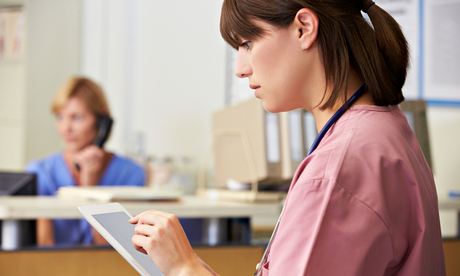
A smart nurse call
system that can send patient alerts or lab results directly to the phone
or tablet of the closest, most appropriately qualified member of staff.
Photograph: Alamy
Overhauls, strategic changes, new objectives: the NHS is no stranger to grand claims and plans about the future of healthcare. However, all too often these plans are political footballs, doing little to improve day-to-day patient care or the working lives of frontline healthcare professionals.
We all know that in the face of budget cuts and rising admissions, NHS professionals at every level are under pressure to do more with less. While change in the NHS is no easy task, investment targeted in the right areas provides huge opportunities to increase efficiency, reduce costs and improve patient care. One recent initiative, the NHS Nursing Technology Fund, has provided some hope for those at the frontline of health services.
A recent freedom of information request submitted to NHS trusts across England highlighted that, despite the pledge to create a "paperless NHS" by 2018, two-thirds of nurses and medical staff continue to rely on handwritten notes and corridor conversations to communicate vital patient information. Another survey of NHS staff recently found that, although 37% of those surveyed did not have access to a Wi-Fi network installed at work, 66% felt that this would improve their ability to provide good quality care.
This system of pagers, fixed terminals and handwritten notes draws nurses away from patients. But sophisticated mobile communication technology could turn the situation around, allowing nurses to effectively be at their patients' bedsides whenever required. Technology can identify new ways to reduce administration and speed up decision-making, knowledge transfer, delegation and equipment finding. The right tech means nurses can spend more time with patients, imporving the quality of care they can provide.
The key is to take advantage of opportunities such as the Nursing Technology Fund to adopt technology that makes it easier to communicate and share information on the move. Nursing is clearly not a sedentary role. If nurses are equipped with devices and tools that allow them to quickly input data, contact colleagues or respond to patients, they'll be free to focus their attention where and when it is needed most.
Consider three simple capabilities that could run on a mobile device and improve the lives of clinical staff and patients alike:
• A smart nurse call system that can send patient alerts or lab results directly to the phone of the closest, most appropriately qualified member of staff. This means that nurses can respond to patients' needs immediately without necessarily having to walk back to their room. The result? Peace of mind and a comprehensive view of activity on the ward.
• Barcode scanning would help ensure the right medicine is being given to the right patient or that the right person has turned up for surgery accompanied by the right paperwork. By using a device equipped with a scanner nurses can be rapidly assured that no errors have been made.
• Geo-location of vital equipment could save hours of wasted time searching the hospital and ensure essential pieces of kit are well distributed across wards. Wheelchairs, medical devices, even beds can be easily fitted with RFID tags and then identified with a mobile device, allowing nurses to find what they need quickly and easily.
• Static technology, no matter where it is located, will create delays. Short periods of time spent walking to an information source add up if repeated over the course of a long shift.
However, when we talk mobile devices we don't mean consumer-grade smartphones and tablets. A day in a ward or in A&E will quickly demonstrate that these flashy bits of equipment aren't cut out for serious work.
In a demanding hospital environment, smartphones will be prone to breakages, water damage from chemical cleansers, drained batteries and network blackspots – leading to inconvenience, expensive repairs and an extremely high cost of ownership. More seriously, we saw recently that smartphones pose a hygiene risk, potentially spreading viruses like MRSA.
The NHS needs to invest in purpose-built, smart mobile communication devices if it is to improve patient experiences, nurse satisfaction and hospital efficiency. And with £70m of the Nursing Technology Fund still to be distributed, the means are finally available to make a difference.
No comments:
Post a Comment